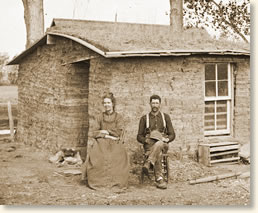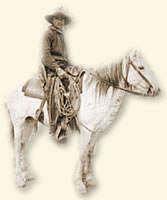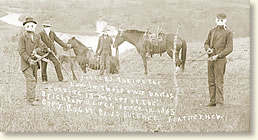|
Ranchers and Farmers
Collide in Nebraska, 1884
Solomon Butcher came to Nebraska from the East in 1880 to farm. After five years of struggle he realized that he was not tough enough to meet the demands of the homesteader's life. He had, however, developed a sincere admiration for those who could and devoted the next 26 years of his life to photographically documenting their lives.
 |
| Solomon Butcher |
A Homesteader Couple Poses
Proudly in Front of Their "Soddie"
| The end of the Civil War unleashed a migration of thousands of expectant pioneers who crossed the Mississippi River to the plains lured by the government's promise of 160 acres of free land to any who could homestead it for five years. It was a hard life and a precarious existence that began as soon as the settlers arrived. Those who migrated to the Nebraska plain were forced to build their homes out of slabs of sod carved from the almost treeless landscape. The exposed soil was then plowed for crops. These "soddies" were naturally infected with all kinds of vermin ranging from insects to snakes and inherently dirty. However, it was better than living in the open.
Another challenge came from the established ranchers whose cattle grazed on expansive stretches of government land now open to settlement. Clashes between the newcomers and the cattlemen were inevitable and often violent.
Solomon Butcher kept a diary describing the homesteader's life and tells of an incident in which the homesteaders, faced with the ranchers' refusal to remove the fencing surrounding their grazing land, took matters into their own hands:
"Early in the fall of 1884 a few settlers located homesteads in the northeast corner of the Brighton Ranch Company's pasture, on Ash creek. This pasture was about fifteen miles square and extended several miles south of the Loup River almost to Broken Bow, and was enclosed with a wire fence. The land being government land, and subject to entry, these settlers served notice on the ranch company to remove their fence from about their claims within thirty days.
The company paid no attention to this request, and at the expiration of the time the settlers made a raid on the fence and appropriated the posts to make roofs for their sod houses. Roofs in those days were made by laying a large log, called a ridge log, lengthwise of the building at the top. The fence posts were then laid up to form the rafters, to which brush was fastened, the whole being covered with one or two layers of prairie sod, coated with several inches of yellow clay procured from the canyons, which turned the water effectually.
In a short time after the appropriation of these posts the foreman of the ranch had the settlers arrested and taken to Broken Bow for trial. The sheriff had no sooner departed with the prisoners than the second foreman of the ranch rigged up two large wagons, drawn by four mules each, and proceeded to the

|
houses of the settlers, accompanied by a number of the cowboys. They drove up to a house, took a team and large chain, hitched onto the projecting end of the ridge log, and in about three seconds the neat little home was a shapeless mass of sod, hay, brush and posts mixed up in almost inextricable confusion. The ranchmen then culled their posts from the wreck and loaded them into the wagons, when they went to the next house and repeated the operation, leaving the occupants to pick their few household goods out of the ruins at their leisure. The boys were having great fun at the expense of the settlers, cracking jokes and making merry as the work of destruction went on. After destroying several houses in this manner they proceeded to the claim of a Mr. King, and Mrs. King, seeing them approaching, met them with a shotgun and dared them to come on. Had it been Mr. King, the invitation would possibly have been accepted, but the cowboys were too gallant to enter into a quarrel with a lady, and withdrew without molesting her.
In the meantime a boy of the settlement had been dispatched to Broken Bow on the fastest pony that could be procured, to secure help, and quite a posse of men from the town started for the scene of action. The foreman of the ranch, who was in Broken Bow at the time as complaining witness against the settlers, heard of this and sent one of his cowboys in haste to warn the second foreman of the impending invasion. This messenger arrived at the settlement in advance of the citizens and gave the alarm. The housewreckers were thoroughly scared, and turning the heads of their mule teams towards the South Loup, applied the whip freely. As the mules began to run over the rough prairie the posts began to fall off the wagons, and as the teams began to show signs of weariness the cowboys began to heave off more posts to lighten the load as they bumped along, leaving a trail behind them like that of a railroad construction gang.
 |
| Solomon Butcher |
Homesteaders reenact the
cutting of a rancher's wire fence |
Arriving at the ranch, they turned out their mules, secured their Winchesters and made a break for the hills on the south side of the river to await developments. When the posse of rescuers arrived at the little settlement and found the invaders gone, they did not follow them, but returned to Broken Bow. The cowboys remained in the hills two days, watching for the approach of the enemy in vain.
The ranch company failed to make any case against the settlers, it being shown that the ranch pasture was government land and that the claims were lawfully held by the homesteaders, who had a perfect right to remove the fence which enclosed their property. The prisoners were accordingly released and were not again molested. The second foreman of the ranch was subsequently arrested for tearing down the houses of the settlers, tried at Broken Bow, found guilty, fined $25 and costs and confined one day in the county jail"
References:
Solomon Butcher's account appears in: Butcher, Solomon D., Pioneer History of Custer County, Nebraska (1965); Bartlett, Richard A., The New Country: a Social History of the American Frontier, 1776-1890 (1974); Boorstin, Daniel J, The Americans: the National Experience (1965).
How To Cite This Article:
"Ranchers and Farmers Collide in Nebraska, 1884" EyeWitness to History, www.eyewitnesstohistory.com (2005).
|






